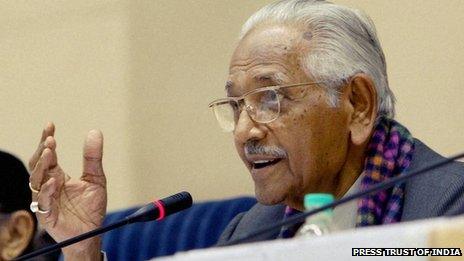Delhi rape: PM promises to pursue panel recommendations
- Published

Justice Verma criticised the way India is governed and said the public had been failed
India's government will "pursue" the recommendations of a panel which reviewed the country's laws on sex crimes after the fatal gang rape of a student, the prime minister has said.
Manmohan Singh wrote to the panel's head, ex-chief justice JS Verma, saying the report would be taken up promptly.
The commission called for faster trials and longer sentences for convicted rapists, but not the death penalty.
The brutal gang-rape on a Delhi bus caused outrage across the country.
Last week, Justice Verma said his three-member commission had received 80,000 responses from India and abroad on how to reform rape laws. But not a single Indian state police chief had sent recommendations.
He also criticised the way India is governed and said the authorities had failed in their duties to the public.
'Labour of love'
"I assure you that we will be prompt in pursing the recommendations of the committee," the prime minister wrote in a letter released to the press, external on Wednesday.
He also thanked the three-member panel for their "labour of love" in completing the work of the committee "our government had constituted to recommend amendments in law to be able to deal effectively with cases of sexual assault of extreme nature against women".
The three-member committee, which was given one month to submit its report to the government, included retired justice Leila Seth and former Solicitor General Gopal Subramanian.
They handed in their 630-page report on 23 January in which they suggested amendments to criminal laws to provide for higher punishment to rapists.
The brutal assault on the 23-year-old woman on 16 December shocked India and sparked a debate about the treatment of women.
The student, who cannot be named in India for legal reasons, was attacked after boarding a bus in south Delhi with a male friend.
Police said the assailants beat both of them, and then raped the woman. She suffered massive internal injuries and died nearly two weeks later.
The incident led to nationwide protests against the treatment of women in India. Campaigners called for tougher rape laws and reforms to the police, who have been accused of often failing to file charges against attackers.
Six suspects were arrested for the crime. Five of the accused are on trial at a specially convened fast-track court in Delhi.
If convicted, they could face the death penalty. A sixth suspect, who is 17 years old, is to be tried by a juvenile court.
The government has said it will bring in stronger sexual assault laws and has established several committees to recommend changes.
It has also promised to fast-track future rape cases. Legal proceedings in India sometimes involve years of delays.